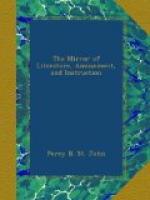III. Another torment may be used as follows.—
Dismount from thy horse (or gig) and take two round, smooth pebbles, which put into one ear of your horse, and tye up the ear, that they escape not, then mounting and proceeding on thy journey, thou shall have thy desire, for the noise of the stones jingling in his ear, will not fayle to make him go, until he is utterly tired.—Markham’s Farriery.
* * * * *
SPIRIT OF THE PUBLIC JOURNALS.
BEAUTIES OF THE PILGRIM’S PROGRESS.
The characteristic peculiarity of the Pilgrim’s Progress is, that it is the only work of its kind which possesses a strong human interest. Other allegories only amuse the fancy. The allegory of Bunyan has been read by many thousands with tears. There are some good allegories in Johnson’s works, and some of still higher merit by Addison. In these performances there is, perhaps, as much wit and ingenuity as in the Pilgrim’s Progress. But the pleasure which is produced by the Vision of Mirza, or the Vision of Theodore, the genealogy of Wit, or the contest between Rest and Labour, is exactly similar to the pleasure which we derive from one of Cowley’s Odes, or from a Canto of Hudibras. It is a pleasure which belongs wholly to the understanding, and in which the feelings have no part whatever. Nay, even Spencer himself, though assuredly one of the greatest poets that ever lived, could not succeed in the attempt to make allegory interesting. It was in vain that he lavished the riches of his mind on the House of Pride, and the House of Temperance. One unpardonable fault, the fault of tediousness, pervades the whole of the Fairy Queen. We become sick of Cardinal Virtues and Deadly Sins, and long for the society of plain men and women. Of the persons who read the first Canto, not one in ten reaches the end of the first book, and not one in a hundred perseveres to the end of the poem. Very few and very weary are those who are in at the death of the Blatant Beast. If the last six books, which are said to have been destroyed in Ireland, had been preserved, we doubt whether any heart less stout than that of a commentator would have held out to the end.
It is not so with the Pilgrim’s Progress. That wonderful book, while it obtains admiration from the most fastidious critics, is loved by those who are too simple to admire it. Doctor Johnson, all whose studies were desultory, and who hated, as he said, to read books through, made an exception in favour of the Pilgrim’s Progress. That work, he said, was one of the two or three works which he wished longer. It was by no common merit that the illiterate sectary extracted praise like this from the most pedantic of critics, and the most bigoted of tories. In the wildest parts of Scotland the Pilgrim’s Progress is the delight of the peasantry.




